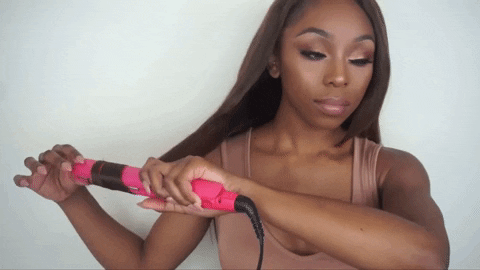
Let me just hit you with the real—stress kills. That's not an exaggeration either. Headaches, heart disease, diabetes, obesity and even depression are all things that, not only are oftentimes brought on by stress but are also made worse when we don't get our stress levels down. That's why, the older (and prayerfully wiser) I get, the more I make sure that if there's one thing I won't let get to me, it's stress. That requires making sure that the people, places, things and even ideas that try and get me all shook up and frazzled are monitored closely. The stuff that I honestly don't have to deal with, I don't. The things that I do, I set boundaries and also monitor how much time I engage. Because nothing and/or no one is worth having a nervous breakdown over, simply because I didn't know how to manage my stress well.
In walks, the focus for this piece. If you know that you're someone who lets stress get to you, far more than it ever should, here are 10 practical ways to keep outside stresses from totally wrecking your insides. Because sis, it's really not worth it. Not at all.
1. Meditate
There's a Scripture in the Bible that says, "Be angry, and do not sin. Meditate within your heart on your bed, and be still. Selah." (Psalm 4:4—NKJV) I like that a lot because some "super churchy folks" think that meditating isn't a "Christian" thing to do. The Bible actually shouts out meditating quite a bit (the word "meditate" is mentioned in the NKJV of the Good Book 20 times). I get why too when you factor in that mediating promotes emotional stability, reduces anxiety, lengthens your attention span, boosts your libido, helps you to breathe better and yes, reduces stress (and that's just the tip of the iceberg when it comes to the good that meditation provides!). So, if you're someone who knows that you let outside stressors get to you, way more than you should, start off each day by meditating 15 minutes or so. Just getting calm and quiet as you deeply breathe in and out can center you in a way that nothing else can.
2. Keep a Stress Diary
OK, so where's your journal at? Today, we're gonna tackle how it can be used to combat stress. By using it to jot down the specific times and instances that caused you to feel stressed out, it can help you to better understand your triggers so that you can work towards deactivating them more effectively. Basically, what you do is, either at the beginning or end of your day, you recap the past 24 hours. Write down the date and instance that stressed you. Then rate on a scale of 1-10 how it made you feel. After that, on a scale of 1-10 again, also write down how you feel about the matter now and what you did in order to feel less upset/anxious/worried about it. If the number hasn't gone down any notches, express, on paper, why that is the case. Finally, write down some things that you think could help you to de-stress and handle the situation more effectively—both now and in the future.
If you do this consistently, not only will you probably start to see patterns that lead to your stress but you'll (hopefully) be able to come up with remedies that can help you to let go of your stress a lot quicker too. If you want to learn more about how to create a stress diary, there's a pretty thorough read about it here.
3. Honor Your Own Love Language
Over on this platform, we write about love languages quite a bit. Just as a quick review, there are (basically) five of 'em—words of affirmation, quality time, physical touch, acts of service and gifts. All of these define different ways that we prefer to have love expressed to us best. But have you ever thought to ask yourself if you are fluent in speaking your own love language…to yourself? For instance, the two languages that basically run neck and neck for me are words of affirmation and physical touch. Because that is the case, something that I make a point and practice to do more is hype my own self up (one way to do that is by checking out the article, "Every Woman Should Write A Love Letter To Themselves"). I also find positive quotes, I focus on maintaining a healthy body image and I sometimes even audibly tell myself what I appreciate about my uniqueness and individuality. On the physical touch tip, the route I take is giving myself scalp massages and enjoy soaking in the tub (to some 90s R&B).
And what if your love languages are one of the other three? Quality time can be about getting off of social media and/or turning off your phone so that you can binge-watch a favorite show, read or zone out to one of your favorite throwback music playlists. Acts of service can be something like creating a to-do list so that you aren't always rushing to get things done. And gifts? I am a huge advocate of setting aside money, every payday, that goes to nothing but frivolous spending.
Love languages are dope, but they are most effective when you speak them to yourself before speaking them to others. I can most definitely promise you that.
4. State Your Boundaries (CLEARLY)
Think about the last time that you were stressed out to the point of being totally pissed off. I would be floored if it didn't have something to do with someone violating your boundaries on some level. After all, it can't be—pardon the pun—stressed enough that boundaries are limits and limits are oftentimes put into place so that you're not pushed past what you can handle at any given point and time. If you're like me and you grew up in an environment where your boundaries were constantly violated and/or dismissed, you might not really understand how to create them as an adult; this is how a lot of people can end up taking advantage of you. So, one day this weekend, take a moment to think about what your limits are vs. what they should be in order for you to maintain some level of inner peace. If that's spending less time with toxic family members, so be it. If that's releasing so-called friends who are proving to be more like foes, do that (check out "10 Signs You've Got A Close (TOXIC) Friend"). If that means moving on from your emotionally abusive boss, take that leap of faith.
In some ways, life is too short for drama. But in others, I also agree with Chris Rock when he said in the movie, I Think I Love My Wife, sometimes life can also seem really long. Yet, regardless of your personal take, who wants to spend all of their days stressed all of the time, no matter how short or long time seems to be? Personally, my life has improved, exponentially so, since I've drawn some limits on how I allow people to talk to me and/or treat me. And because of that, stress doesn't transpire nearly as much as it used to. (Hmph. Funny how that works, huh?)
5. Don’t Expect People to Be Like You
A personal lesson that has been oh so very freeing for me is getting to a point and place where I stopped expecting people to think or act like I do. Man, did I spend (and oftentimes waste) a lot of time trying to get over the shock that folks I knew wouldn't approach matters in the same way as I did. And when I wouldn't let that reality go, it really would make my blood boil and totally stress me out to no end. The thing about individuality is it means that all of us are different. That doesn't automatically mean that when someone is wired in another way that they are "bad" or "wrong"; they're just different.
A good example of this is, the last boyfriend I will ever have in this lifetime, he wasn't big on commemorating special days. Meanwhile, I'm a Gemini. If you don't get what that means, many of us tend to be on-10 about celebrating things like birthdays and anniversaries. So, while I typically took it over the top on his birthday and our anniversary, for pretty much our entire relationship, as far as how he approached my days, I was very much so less than impressed. To be fair, he was pretty good when it came to speaking my love languages, yet I still resented him for not thinking like I did on the celebratory tip. It's a part of what caused our disagreements and ultimately, what ended our relationship.
In hindsight, I get that if I had spent more time deciding if I wanted to be with someone who thought like he did rather than trying to turn him into another me, we both would've been much happier. Definitely, a huge cause of outside stress is trying to make people be you when that isn't realistic or fair. And honestly, it can lean towards the arrogant side too. Either accept folks as they are or shift the dynamic. Accepting this as being your two choices will make your life flow so much smoother.
6. Manage Your Time Wisely
If humans are getting on your very last nerve, one way to balance all of that stress out is to prioritize your time. Have a time set aside for your priorities, a time set aside to spend quality time with your family and friends, and time set aside for social media. While some people frown on creating weekly schedules, you might be surprised by how helpful it can be to wake up every day, knowing exactly what you plan to do, and what can/should be put on hold until another day. That way, if people, places, things or even ideas that aren't on your schedule try and shake your peace, you can remind yourself that if they were pertinent, they would've been on your list. Since they're not, they can wait until later. And the really great thing about the word "later" is getting to it is totally up to you.
7. Control ONLY What YOU Can Control
I'm pretty sure you've heard the phrase, "Don't sweat the small stuff". A good example of not doing that is making the choice to not try and be a control freak or worry wart out here. As someone who is a recovered control freak (for the most part, anyway), I can't tell you how freeing it has been to really accept the fact that, at the end of the day, all that I can really control is myself. No matter what or who has the potential to bother ("Gaslighting, Love Bombing & 5 Other Triggers To Call Out In Your Relationships") or trigger me (check out "How To Handle Folks Who 'Trigger' You"), they can only affect—or infect—me as much as I allow them to. Not only that but, when I've done the absolute best that I can (not based on anyone's standards but the Most High's and my own), then…what else can be done? On my end? Nothing.
If a lot of us were really real with ourselves, we'd admit that a lot of the outside stress that bothers us comes from us trying to take on what is either none of our business or is out of our hands. If you don't get anything else out of this, get that controlling self only is a superpower when it comes to no longer stressing yourself out.
8. Vent
One of the main reasons why a lot of people find themselves stressed out to the point where they almost feel like they're about to lose it is because they internalize their feelings and frustrations rather than vent them. Believe it or not, venting is actually really good for you because it helps you to release negativity, bring balance back to your mental and emotional state and, when you're doing it in a safe space (like in the presence of a friend who you fully trust), sometimes you can hear another perspective that can help to bring about clarity. The problem is, a lot of people hold stuff in so long that, when they do let everything out, it can be at the wrong place and at the wrong time.
I will admit that it requires quite a bit of self-awareness to know when you're almost at your breaking point. But try and make it a practice of getting to a place where you are totally alone to scream out your angst or hitting up a friend before snapping at work, on your kids or you're at a place that is totally inappropriate. Otherwise, all you'll be doing is adding to your stress rather than taking it away.
9. Forgive
From a biblical perspective, the Bible is quite clear. If you want God to forgive you, you must forgive others (Matthew 6:14-15). I know that can be hard for a lot of people to accept but, as I continue to learn more about this forgiveness thing, I get that accepting what the Word says on it is a humbling experience. None of us are perfect and all of us need forgiveness. And beyond that, a quote on forgiveness that comes to mind is, "Forgive others, not because they deserve forgiveness. Forgive them just because you deserve peace." (I think a man by the name of Jonathan Lockwood Huie said it.) And you know what? This statement is 1000 percent true.
It's been my personal experience that people who don't know how to forgive (or feel like someone doesn't deserve forgiveness) seem to struggle a lot more with true inner peace than those who do forgive others. I think it's because a lot of folks who don't, they think that forgiveness means excusing bad behavior or giving the person who hurt or harmed them a pass. No, forgiveness means that you get that humanity can disappoint, but nothing is worth holding onto pain for so long that it shakes your own mental stability and emotional space. Unforgivingness typically breeds all kinds of anger and/or sadness and/or stress and anxiety. So, release who and what has offended you so that you can get back to feeling totally tranquil and calm, within yourself, again.
Get No Less Than Six Hours of Sleep
One more. I've got a friend who is the most pleasant person you'd ever wanna know. They will give you their left thumb if you really need it. I'm not playing. But man, if they go a good three days without at least six hours of sleep, they suddenly turn into Grendel's mother (you know, from Beowulf). I'm. Not. Kidding. We're not created to be sleep deprived yet, unfortunately, reportedly, 1 in 3 of us do not get enough rest. And since sleep deprivation leads to things like irritability, lack of focus and concentration, mood swings, anxiety, weak immunity, accidents and a sucky sex life—how could you not think that poor sleeping habits wouldn't lead to you being completely stressed out?
Words can't express what a night of uninterrupted sleep can do for a person. So, if you know that stress is something that you struggle with, make getting more sleep a top priority. It's one of the most effective ways to woosah your way through life—no matter who or what has the potential to stress you…on the outside of your own mind, heart and home's walls.
Join our xoTribe, an exclusive community dedicated to YOU and your stories and all things xoNecole. Be a part of a growing community of women from all over the world who come together to uplift, inspire, and inform each other on all things related to the glow up.
Featured image by Giphy
- Stress management: Prevent setbacks - Mayo Clinic ›
- Stress and Relationship Functioning in Same‐Sex Couples: The ... ›
- 10 Ways to Fight Stress Spillover in Your Relationship | Psychology ... ›
- How to Never Feel Stressed at Work Again ›
- Don't Let Your Stressed-Out Boss Stress You Out ›
- Managing Stress to Control High Blood Pressure | American Heart ... ›
- How to Manage Work Stress, According to Psychologists | Time ›
This Is How To Keep 'Holiday Season Stress' From Infecting Your Relationship
Hmph. Maybe it’s just me, but it seems like there is something really weird happening in the fall season air (because winter doesn’t officially begin until December 21) that cuddle season is in full swing while break-up season is as well. In fact, did you know that break-ups are so popular during the holiday season that December 11 is deemed Break-Up Day?
The reasons why relationships shift around this time vary; however, I did both roll my eyes and chuckle when I read that a very popular one is because it’s an easy way to get out of getting one’s significant other a Christmas present. SMDH.
Anyway, I personally think that the less shallow folks out here may contemplate calling things “quits” or they at least distance themselves a bit from their partner (and what I’m referring to is serious relationships) due to all of the stress and strain that oftentimes comes with the holidays whether it be financial, familial, due to their tight schedules or something else.
Listen, I would hate for you and your man to miss the fun and happiness of experiencing this time of year, all because you are so overwhelmed or irritated that you can’t really enjoy it. That’s why I have a few practical tips for how to avoid allowing the typical holiday season stress from INFECTING your relationship.
Manage Your Expectations
 Giphy
GiphyUnmanaged expectations. If there is a main reason why the holiday season tends to be so stress-filled for so many people, I’d bet good money that this is the cause. And when you’re in a long-term relationship, expectations can manifest themselves in all sorts of cryptic and/or unexpected ways. You might have relatives who assume that you are going to be with them for Thanksgiving or Christmas when you have other plans in mind. You might be thinking that you are going to spend one amount for presents while your man is thinking something totally different. When it comes to scheduling, your signals may be crossed.
And you know what? To all of these scenarios, this is where clear and consistent communication come in. Don’t assume anything. Don’t dictate anything either. From now until New Year’s, mutually decide to check in once a week, just to make sure that you are both on the same page as it relates to the holidays and what you both are thinking will come along with it. The less blindsided you both feel, the less stressed out you will be. Trust me on this.
Set (and Keep) a Budget
 Giphy
GiphyOkay, so I read that last year, 36 percent of Americans incurred some type of holiday-related debt. Hmph. Last year, there was still some sense of normalcy in this country, chile, so I can only imagine what finances are gonna look like over the next several weeks. That said, since I don’t know a lot of people who don’t find being broke stressful, make sure that you and your bae set a budget and then stick to it this year — no ifs, ands or buts.
Because really, y’all — it doesn’t make sense to deplete savings and/or max out credit cards for a few days of giggles only to be damn near losing your mind because you don’t know how to make ends meet come Dr. Martin Luther King, Jr. Day.
And by the way, this tip doesn’t just speak to things like food and gifts; I also mean travel. If it doesn’t make a ton of sense (or cents) to be all over the place this year — DON’T BE.
Keep Matthew 5:37 at the Forefront
 Giphy
GiphyIf off the top of your head, you don’t know what Matthew 5:37 says, no worries, here ya go: “But let your ‘Yes’ be ‘Yes,’ and your ‘No,’ ‘No.’ For whatever is more than these is from the evil one.” That verse right there? Oh, it’s a boundaries lifesaver! I say that because do you see “maybe” or “I’ll think about it” in there? Nope. LOL. It says that you should tell people “yes” or “no” and leave it at that — and that complements Anne Lamott’s quote, “’No’ is a complete sentence” impeccably well. Yeah, you’ve got to remember that anything beyond a yes or no to a request is privileged information; you don’t owe anyone details or an explanation.
Besides, if you are really honest with yourself, when someone asks you something and you give a “Umm, let me think about it” kind of reply, more times than not, you already know what your answer is going to be — so why not let you both off of the hook? Give your response. Commit to that. And let everyone (including yourself) get on with their lives and schedules.
I promise you that when it comes to those holiday parties, you are pissing more folks off by not RSVP’ing or doing so and not showing up than just saying, “Thank you but not this year” off the rip.
Remember That Your Personal Space Is Privilege Not a Right
 Giphy
GiphyA friend of mine recently bought a new house and invited me over to come see it. He’s a single man with no children, so as I was taking in all of the space that he had, especially as I walked through his finished basement, I joked about relatives coming to live with him. “Hell no” and “absolutely not” were pretty much his immediate responses as he went on to say that some folks even had the nerve to be offended when he told them that he had no intentions on taking DNA in.
Ain’t it wild how people think that your stuff is their right? And yes, that brings me to my next point. Your home is your sanctuary space. If you want to host folks this year — cool. If not, ALSO COOL. Please don’t let folks (family included) guilt you into how they want you to act or even into what they would do if the shoe was on the other foot. You are not them — and as one of my favorite quotes states, “If two people were exactly alike, one of them would be unnecessary.” (A man by the name Larry Dixon said that.)
Hell, my friends? They know that I am good for sending them random things that they need or even want all throughout the year. Coming over to hang out at my pace, though. Uh-uh. Chalk it up to being a card-carrying member of the ambivert club yet I like keeping my living space personal — and I sleep like a baby, each and every night, for feeling that way.
Always remember that your space, your time, your resources, your energy and shoot, yourself period (including your relationship), are all things that are your own. You get to choose how, when and why you want to share them. The holiday season is certainly no exception.
Cultivate Some “You Two Only” Traditions
 Giphy
GiphyIt’s not uncommon for some couples to hit me up after the holiday season to “detox.” Sometimes it’s due to the financial drama (and sometimes trauma) that they experienced. Sometimes it’s because they allowed their relatives (especially in-laws) to get more into their personal business than they should’ve. More than anything, though, it tends to be because they didn’t get enough quality time together and so ended up feeling “disconnected.”
Please don’t let that happen. Listen, I’m not even a holidays kind of woman and yet, I will absolutely sit myself down with some hot chocolate and chocolate chip cookies to enjoy a Hallmark holiday film or two. Aside from the fact that most of them are lighthearted and sweet, I also like that they usually focus on couples loving on each other amidst all of the holiday beauty and ambiance — which is something that all couples should set aside some time to do.
Maybe it’s a vacation. Maybe it’s a staycation. Or maybe it’s my personal favorite, A SEXCATION. Whether it’s for a few days, the weekend or even overnight — don’t you let the holidays go by without setting aside time for you and your man to celebrate one another. Don’t you dare (check out “Are You Ready To Have Some Very Merry 'Christmas Sex'?”).
GET. SOME. REST.
 Giphy
GiphyI once read that 8 out of 10 people get stressed out over the holidays and 3 out of 10 lose sleep during to it — and when you’re stress-filled and sleep-deprived, that can absolutely lead to hypersensitivity, making mountains out of molehills and even not being in the mood for sex.
Your relationship can’t afford to go through any of this, so definitely make sure to prioritize rest. I don’t care how unrealistic it might seem during this time, sleep should never be seen as a luxury; it will always and forever be a great necessity.
That said, try to get no less than six hours of shut-eye in (check out “6 Fascinating Ways Sex And Sleep Definitely Go Hand In Hand”) and even ask your bae to take a nap with you sometimes (check out “Wanna Have Some Next-Level Sex? Take A Nap, Sis.”). Not only will sleep help to restore your mind, body and spirit but, when it’s with your partner, it’s an act of intimacy that can make you both feel super connected, even in the midst of what might feel like chaos.
___
Holiday season stress is real. Still, never give it the permission or power to throw your relationship off. Put you and your man first and let the holidays be what they are gonna be, chile.
Let’s make things inbox official! Sign up for the xoNecole newsletter for love, wellness, career, and exclusive content delivered straight to your inbox.
Featured image by Shutterstock
It’s probably been over the past 2-3 years that I’ve become hyper-focused when it comes to applying certain chemical exfoliants known as acids to my skin. Personally, I’ve come to really appreciate ones like mandelic acid and hyaluronic acid because they have a way of softening my skin, brightening it up and really evening out my complexion overall.
In fact, on my skin, they have been so effective that they have caused me to wonder what would happen if I applied some of them to my hair too — and boy, was it an experiment that paid off big time!
If, while on your continual journey to get the best out of your own tresses, you’d like to learn how to get them healthier than it’s ever been, I’ve got seven acids that are typically known for skin use that can be just as beneficial to your hair as well.
1. Salicylic Acid
When it comes to your skin, salicylic acid is beta-hydroxy acid that is great for your skin if you’re looking for something that will exfoliate it, clear out your pores and dissolve dead skin cells. In fact, this is why it’s an acid that is quite popular when it comes to treating acne.
Your hair will enjoy salicylic acid because, if you’re looking to remove product build-up, you want to soothe an itchy or irritated scalp or you’ve got some dandruff flakes that are totally driving you up the wall, salicylic acid has the ability to treat all of this. Either purchasing a shampoo that contains this ingredient or adding it to your favorite scalp scrub is probably the most effective way to get the most out of it.
Just make sure that if your scalp is sensitive or dry that you approach with caution. In these instances, it could end up irritating your scalp more than helping it out, so use a very little bit in the beginning to make sure that it vibes with you.
2. Lactic Acid
Lactic acid is an alpha hydroxy acid that can help to even out your skin tone as well as slow down the signs of aging. The properties in it help to do this by reducing hyperpigmentation and boosting collagen production in your skin as well as keeping it hydrated.
Why is it great for your locks? For one thing, lactic acid is considered to be a humectant. This means that it pulls water from the air so that your hair is able to remain moisturized.
Another thing that makes it a winner is the fact that lactic acid breaks down dead skin cells on your scalp (so that your hair follicles are able to flourish), it can help to soften and detangle your hair (making it a helpful addition on your wash days) and it also helps to protect your tresses from heat styling tools and UV damage. Applying a hair rinse that’s made up of part lactic acid and part water can work wonderfully (so long as you apply it once a month, tops; more than that might be too “intense” for your hair strands).
3. Glycolic Acid
Glycolic acid is a water-soluble alpha hydroxy acid that is actually made from sugar. Your skin will adore it because it smooths the appearance of fine lines and wrinkles, improves the texture of your skin, gently exfoliates, clears your pores and brightens up your complexion overall.
The reasons why you should consider this acid for your hair is because it helps to keep your scalp youthful (and yes, there is such a thing; check out “Your Scalp Ages Six Times Faster Than Your Face. Why It Matters.”), removes excess sebum (that could be clogging up your hair follicles) and it helps to keep your hair moisturized. Your best bet here is to make it a part of your pre-shampooing ritual.
4. Succinic Acid
Succinic acid is an acid that is made from sugar cane and contains antimicrobial and anti-inflammatory properties. Although it doesn’t exactly exfoliate (like many of these other acids do), it can still be beneficial to your skin when it comes to reducing the kind of irritation that is associated with eczema, decreasing the bacteria that leads to breakouts and keeping your skin pretty hydrated.
As far as your hair goes, this is an acid that is worth trying out because it helps to balance the sebum that is on your scalp, remove dead skin and product build-up that can irritate your scalp and clog your hair follicles and, succinic acid is also beneficial when it comes to reducing dandruff and helping to prevent hair loss. Most people tend to apply this as a serum.
5. Hyaluronic Acid
I’ve officially sung the praises of hyaluronic acid on this platform before. One example is via the article, “Why Your Skin, Hair, And Nails Need Hyaluronic Acid Like...Yesterday.” On the skin tip, hyaluronic acid is great because it deeply hydrates your skin, contains anti-aging properties and can even bring relief to vaginal (including vulvar) dryness.
Your hair will adore this particular acid because it aids moisture to it (including your hair follicles), will help to improve your hair’s texture and it also soothes scalp dryness, nurtures the cuticles of your tresses and decreases frizz. Using a serum rich in this acid as a pre-poo or as a leave-in conditioner is recommended.
6. Azelaic Acid
If you’ve never heard of azelaic acid before, this is your lucky day. It’s a dicarboxylic acid that, when it comes to skincare (and hair care) products, is usually synthetic. Anyway, if you are looking for a way to reduce inflammation, even skin tone after a breakout or if you want to use an exfoliant that will improve the texture of your skin overtime, you might want to give this acid a shot.
This one makes the list as far as your hair is concerned because, if achieving more inches is your current focus, azelaic acid might come in handy. That’s because it is able to strengthen your hair, thicken your strands and also stimulate hair growth from within your hair follicles.
7. Glutamic Acid
Glutamic acid is actually a type of amino acid. Skin-wise, it’s great for deeply hydrating your skin as well as protecting it from pollutants and damaging UV rays. Also, if you’re looking for an acid that treats skin dryness or “tightness,” this could be the answer to your prayers.
Since glutamic acid is also considered to be a humectant, it’s another acid that can moisturize your hair. As a result, it can decrease breakage while helping your hair to feel smooth and look shiny.
BONUS: Amino Acids
Speaking of amino acids and hair, please try to keep some amino acids in your diet at all times. The reason why is because, since your hair is made up of mostly protein (keratin, to be exact), amino acids are pretty darn effective when it comes to helping you to maintain the overall health and well-being of your hair.
Ones to prioritize include proline (it boosts collagen so that your hair strands can maintain flexibility); arginine (it increases blood flow to your hair follicles so that they can receive the nutrients that they need); cysteine (it helps to keep your hair follicles healthy); alanine (it helps your system to produce more collagen), and isoleucine (it strengthens the tissues that help to make up your hair strands). All of these are available in supplement form or you can use Google to see which foods contain them.
___
Although it might initially seem odd to apply acid to your hair, as you can see, certain ones will work miracles for it. So, test them out to see which one tickles your fancy.
Hell, since they work for your skin as well — it’s a two-for-one deal that is worth every penny!
Let’s make things inbox official! Sign up for the xoNecole newsletter for love, wellness, career, and exclusive content delivered straight to your inbox.
Featured image by Shutterstock













